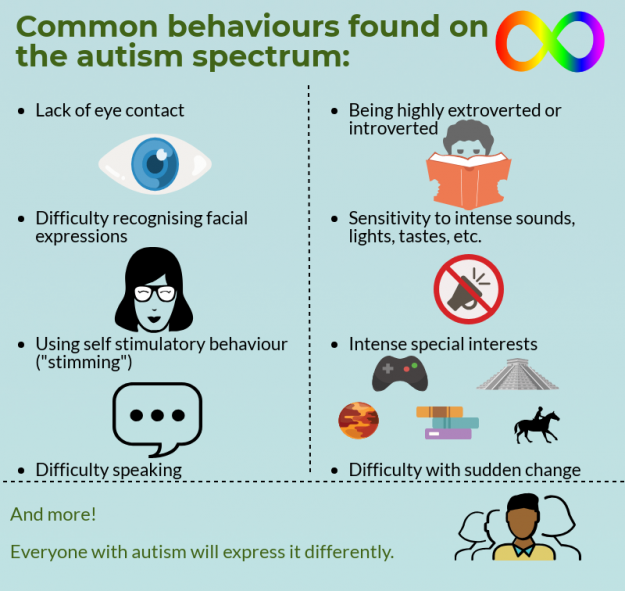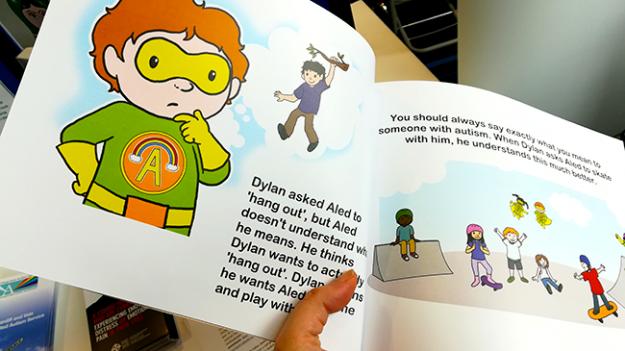Learn some simple steps you can take to make your workplace or classroom more accommodating for people on the autism spectrum.

Films and TV have pushed the image of people with autism as genius savants or social outcasts. Think Dustin Hoffman from the film ‘Rain Man’: emotionally stunted but mentally gifted. But that’s a very black and white perspective of what’s really a rainbow spectrum.
Melissa Blees, from Cardiff University’s Disabilities & Dyslexia service, feels there needs to be “more awareness of the range, that it is a spectrum. A lot of people think of children with severe difficulties, being nonverbal. Or things like ‘Rain Man’.”
Those misconceptions can hurt, and make it harder for people with Autism Spectrum Disorder (ASD) to get the support they need. April is Autism Awareness Month, so it’s time to set the record straight.
“Once you’ve met one person with autism, you’ve met one person with autism,” was a comment repeated by three anonymous members of the community.
That’s a common phrase in the autistic community, referring to the simple fact that ASD is not one thing. It’s a whole host of different traits, behaviours, and skills which vary hugely from person to person.

This means there’s no ‘one size fits all’ support system for ASD. Different people will require different accommodations.
Neither is ASD always a hindrance. One anonymous autistic respondent reflected on his time at university. “I’m not sure, from my point of view, that I would have changed anything. I was fine with the technical aspects. That’s where my neurodiversity has given me an advantage, not a disadvantage.
“It worked for me,” he said. “But that doesn’t mean it would work for anybody else.”
Many people on the autism spectrum find they do well with lecture style learning. However, elements such as note taking or asking questions can be a challenge.
Contributors to a forum for Adults with Autism said that resources like high-quality recordings of lectures can assist in note-taking. Online message where students can ask questions of fellow students and professors may help those who struggle to speak up. Services like these can be beneficial to people who aren’t on the spectrum as well, such as those with anxiety or who speak English as an additional language.
Some university courses already offer these services. Lack of standardisation is the problem. An ASD Community Support Worker who preferred to remain anonymous said, “Sometimes you get that hit-or-miss, patchy, ‘some courses do it and other courses don’t’.”

Other people with ASD struggle more with social interaction and group work. That can be daunting for people who have difficult reading expression, or feel anxiety arranging meetings.
“Some people find striking up conversation with people can be a barrier, but other people it can be knowing when not to strike up a conversation,” said the social worker. “It can be both sides.”
“There isn’t anything wrong with people with ASD,” said another anonymous support worker. “They communicate differently, which can be frustrating both for them and for their family and loved ones, but they feel and they love and they laugh, just like everyone else.”
.embed-container { position: relative; padding-bottom: 56.25%; height: 0; overflow: hidden; max-width: 100%; } .embed-container iframe, .embed-container object, .embed-container embed { position: absolute; top: 0; left: 0; width: 100%; height: 100%; }
These stereotypes make it harder for people to recognise autism in reality. “It’s not as bad anymore, but I’ve heard a lot of students say things like, ‘Oh, you don’t look like you have autism’,” said Blees. “Also be aware that a lot of girls have it, but not necessarily diagnosed.”
Boys are approximately four times more likely to be diagnosed with autism than girls. The social worker said, “It’s not necessarily that there’s differences, it’s how it could be missed. How the diagnostic tools were developed for a group of young boys, and there might be subtle differences.”
“There’s this thing called ‘masking’ or ‘camouflaging’, where girls seem to be a little bit better at fitting in, on the surface,” said the social worker. This may be because women feel more pressure to blend in.
Blees said, “I work with a lot of girls here. Generally they say it’s just really tiring to be masking all the time.”
“Sometimes it’s just other students being more accepting, to make students feel more comfortable,” said Blees. “That actually they can tell their friends, ‘today I just can’t do it’. That they don’t have to say yes to everything.”

There are strategies and services to assist people on the autism spectrum. The Brain in the Hand app helps people manage schedules and prepare for unforeseen problems. “It’s having strategies built into your phone,” said Matthew Williams, Cardiff University Senior Disability Advisor. “You’re going to university, and your bus is late, what do you do? Well I’ve got my timetable on a link here. Or I can start walking, or I can just wait for the next bus. Instead of thinking ‘I’ll go back to my flat because the bus isn’t here.’”
ASD Info Wales lets people build a personal profile where they can add specific tasks they struggle with. The profile will then suggest ways to make those tasks easier to handle.
There are simple changes others can make to help accommodate people on the autistic spectrum. For example, reducing office clutter or distractions before appointments, or providing written instructions along with verbal ones.

Clear communication is particularly important. A common problem, said Blees, is “if you use a tone of voice or an expression or emphasize a certain word to suggest something that you meant, as opposed to just saying it.”
Perhaps the biggest stereotype that the autistic community wants to dispel is the idea that autism is something negative. It can be challenging, but rewarding too.
“Some people have such amazing strengths. They often have quite intense interests, and know so much about their topic,” said Williams. “They’re so knowledgeable, so motivated, so passionate about it, that that’s clearly going to be benefit throughout their life.”
Cardiff University Disability and Dyslexia Services encourages anyone who want support, or more information on autism, to reach out.
